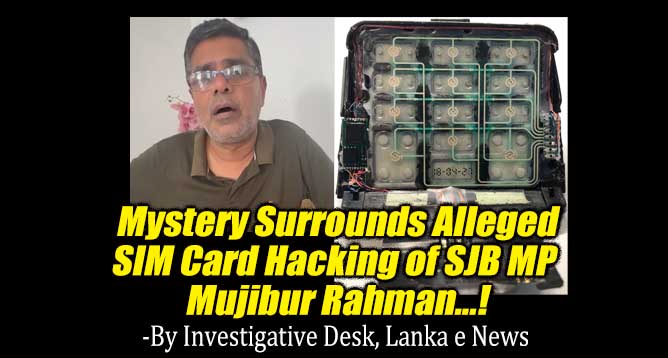-By Investigative Desk, Lanka e News

(Lanka-e-News -29.Oct.2024, 11.00 pm) Sri Lankan politician Mujibur Rahman, an MP representing the Samagi Jana Balawegaya (SJB) party, found himself embroiled in a digital scandal this past week. Waking to a digital nightmare, Rahman discovered that his mobile number and WhatsApp account had allegedly been cloned, manipulated by an unknown entity requesting campaign funds under his name. His immediate concern was that someone had accessed his SIM card, creating a mirror account to impersonate him and send messages soliciting financial support, thus compromising his communication with thousands of contacts.
The attack against MP Rahman began discreetly, with suspicious messages purportedly sent from his account requesting campaign contributions. Initially dismissed by some recipients as a scam or mistake, the operation was confirmed real enough when Rahman issued a video statement acknowledging the breach. In this statement, he emphasized his loss of access to the accounts, cautioning supporters against any solicitations they might receive in his name. The violation not only compromised his private communication but also spread doubt and confusion among his network, affecting his campaign and possibly his reputation.
“I had no choice but to release a public message,” Rahman stated in the video, expressing his frustrations about his identity being misused. The scale of the breach, according to sources close to Rahman, could have potentially compromised over 7,000 contacts – a significant portion of his political support base.
Investigations into the breach have pointed to a troubling theory: it might have been orchestrated by individuals with connections to a neighboring country. Rahman’s team suspects a foreign group intent on derailing his career might be involved, though evidence to support this remains scarce and unconfirmed. Nevertheless, the potential involvement of foreign influence in a Sri Lankan political incident has raised eyebrows and spurred an intense debate within local security circles.
The political climate in Sri Lanka has, in recent years, been increasingly vulnerable to online threats. The sophistication of Rahman’s alleged hacking incident suggests an organized effort, one that is unlikely to be the work of a single individual. Investigators believe that a network with advanced knowledge of cyber tactics and SIM-swapping techniques may be behind the breach, though the specific identity of those involved remains uncertain.
SIM card cloning, also known as SIM card skimming, involves the unauthorized duplication of a mobile subscriber’s identity, enabling a hacker to make calls, send messages, and even access personal accounts as though they were the original user. While such techniques have existed for years, their use in politically motivated attacks appears to be on the rise. For Rahman, the incident serves as a wake-up call to the threat of cyber intrusions in political circles.
Rahman reported the breach to Sri Lanka’s cybercrime investigation unit, where specialists are now analyzing the methods used in the attack. According to a spokesperson from the unit, “Cases like this show the increasing vulnerabilities that individuals in the public eye face. SIM cloning, especially in a political context, is not just a technical breach but a form of character assassination.”
If the investigation confirms Rahman’s account, it could expose serious security risks for political figures in Sri Lanka, highlighting an urgent need for upgraded cybersecurity protocols among politicians and public figures.
The incident is expected to have far-reaching implications for Sri Lanka’s political sphere. With upcoming elections and intensifying political rivalry, a case of digital impersonation and financial solicitation could cause significant damage to reputations, regardless of guilt. Political analysts argue that Rahman’s case exemplifies a broader vulnerability faced by politicians whose public platforms and extensive digital footprints make them ideal targets for such attacks.
One security expert cautioned, “Politicians rely heavily on direct communication with supporters, especially via social media and messaging platforms like WhatsApp. A breach like this doesn’t just compromise their privacy—it’s an existential threat to their political messaging.”
The incident raises a crucial question: how safe are Sri Lanka’s politicians in an era where cybersecurity breaches are an increasing concern? Rahman’s ordeal may prompt a shift in how public figures handle their digital security, with possible discussions on implementing more robust protections across the board. Meanwhile, Rahman awaits the outcome of the investigation, hoping for answers and an opportunity to clear his name of the false solicitations.
As Rahman’s story unfolds, the broader implications for Sri Lanka’s political community are clear. Digital breaches like these don’t just compromise individual privacy; they can undermine the trust politicians work so hard to build.
---------------------------
by (2024-10-29 18:20:12)
Leave a Reply